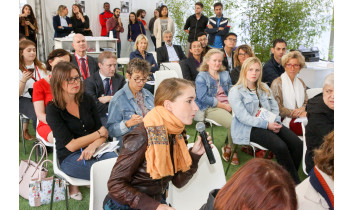
Working with the media to get your message heard
Health is a hot topic. News stories and feature articles on healthcare, health research and personal health experiences are commonplace in the mainstream media and journalists are often looking for a personal perspective on the topic.
A media interview may seem like a daunting prospect. It can feel overwhelming to share something so personal and you may not be sure about the best way to get your message heard. However, the media can be a very valuable platform. If you want to help people understand more about your condition, share your perspective on how health services are delivered, or give an opinion on a new law or policy that affects you, then telling your story can help more people take notice of the issues you are concerned about.
So, what top tips can you follow to see your story in the news?
Framing your story
There are a number of elements a journalist will look for when they are working on a story. If there is an issue you feel strongly about, but you’re unsure if it will be of interest to the media, then ask yourself the following questions:
- Is your story topical? Is the issue in question happening at the moment?
- Is it relevant to a wider audience and can people relate to the story?
- Does your issue have a human-interest angle – can you offer a personal perspective on the topic in question?
- Can the issue in question be described by a superlative? Is it the first of its kind, or the biggest example of the topic you are talking about?
- Contradictions – are you offering an alternative perspective on an issue and countering other views on the topic?
If you answered yes to some or all of these questions, then this is the kind of story that a journalist may be looking for.
Contacting journalists
Working with the press office at a patient organisation or healthcare establishment can make the job of reaching the media easier as they are likely to have contacts with local health reporters. If you are working individually, you could use the following steps:
- Use social media – search for local health reporters from news outlets in your area and see if they are on Twitter or other social media platforms. If you have seen a story covered in the news that you could offer a comment on, find out the reporter’s name and search for them directly.
- Find news desk contact details – look on the website of the media outlet you want to target to find their general news desk contact information. When you contact the general desk, you could ask if they have a specific health reporter to talk to.
Preparing for an interview
It is important to be prepared for a media interview to ensure that you get your key message across and to give a journalist important information on the topic to help with their story:
- Identify your key messages in advance – have three or four points that you would like a journalist to take note of
- Research key facts and figures to support your messages – note down some important statistics or latest research findings that help demonstrate the points you are making
- Rehearse your key messages – although you could have notes with you if you are doing an interview for a printed news outlet, if you are doing a radio or TV interview it is good to practice your messages and how you want to deliver them.
Accessing further support
The European Patient Ambassador Programme provides more information on how to successfully work with the media and top tips for media interviews. You could also contact your local patient organisation for more support before engaging with the media.
Remember that you are an expert in your field and you know your topic well through your own personal experiences. Think about the messages you want people to take away from the news story and keep this at the forefront of your mind during interviews with the media.
Successful interaction with the media could lead to the positive changes you are looking for, such as reducing stigma, improving funding or even affecting policies and legislation.
By Lauren Anderson, freelance health communications and media expert